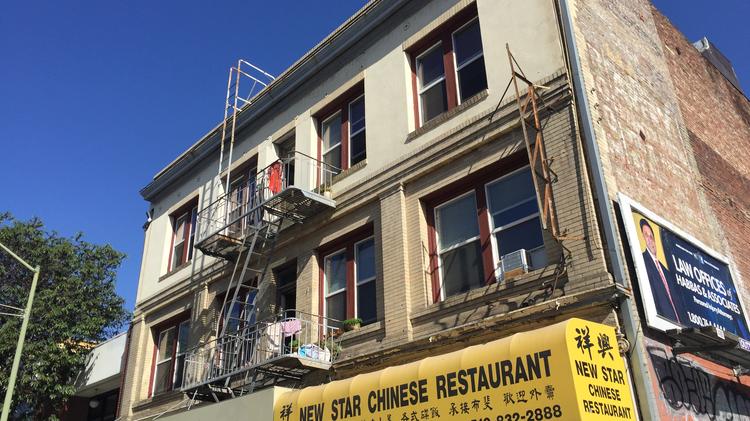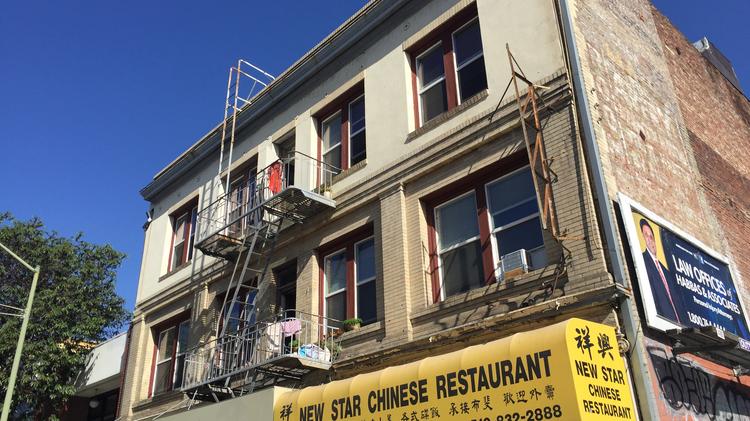
Downtown Oakland SRO Getting Upgrades To Attract Upscale Tenants
Downtown Oakland SRO Getting Upgrades To Attract Upscale Tenants
October 8, 2015
James Kilpatrick has big plans for his latest apartment building investment near downtown Oakland.
The 38-unit building in the Old Oakland neighborhood will have a smartphone-connected entry system, free WiFi, Nest thermostats, and maybe a roofdeck. He hopes those amenities will help draw students and technology workers to the building two blocks south of the convention center.
Future tenants at 524 8th St. will also get a good deal, with cheap studio rents at about $850 a month. Units are about 250 square feet on average.
“A student with Mom and Dad paying, or a a tech tenant who can’t afford three-grand a month in San Francisco might be interested,” said Kilpatrick, president of Lakeside Investment Co., which recently acquired of the building at 524 8th St. for just under $2 million.
But the building is now a single-room occupancy hotel (SRO) that serves mostly poor Chinese-American residents, paying well below market rate.
A trip inside the wood-frame building, built in 1908, shows exposed pipes and chipped floors, but dirt-cheap rents. Tenants in the building pay $368 a month on average, nearly half of Oakland’s average SRO monthly rate of $676. The ceiling had leaked onto the ground-floor Chinese sit-down restaurant for years.
Current residents – mostly elderly folks and recent immigrants – said through interpreters that they can’t afford much else. One man just moved to the country from Hong Kong, another could only work odd jobs.
Of Oakland’s 18 downtown residential hotels, few are slated to make way for more lucrative uses like this one. Another downtown SRO, Hotel Travelers at 392 11th St., is set to turn into a boutique hotel. Most of the city’s SROs are well-located near public transit, surrounded by bars and restaurants, making them prime targets for higher-income residents.
SROs are “a way the private market provides naturally affordable housing,” said Rachel Flynn, Oakland’s planning director. “That’s always a problem when the private market decides it wants to shift clientele. We really can’t control what they do with their private property as long as they comport with displacement laws.”
Negatives and positives
Oakland tenants filed a record number of petitions challenging rent increases last fiscal year. The number of petitions rose by a third to 721, according to a draft of a city report to be released in November.
As part of its “housing equity roadmap,” the City of Oakland wants to boostfinancial assistance for tenants who are displaced and add rental assistance for the homeless. Nonprofits like EBALDC are also part of the solution. That group recently launched a $10 million private fund to acquire and preserve apartment buildings for low-income residents, but it doesn’t cover buildings that need heavy renovations.
“We’re trying to go beyond the traditional approaches. We’re trying to purchase buildings with no city subsidy, but still regulate the rents,” Simon said.
Dwindling SROs
The city just completed the draft of a major study on SROs in preparation for the city’s new downtown zoning plan.
Most SRO residents across Oakland live there permanently and depend on Social Security payments and disability payments as their main source of income, according to the housing department report.
Citywide, the number of private SRO units in Oakland has dwindled by 43 percent over the past decade, from 2,285 units to 1,311 units, according to the report. Many SROs that have changed uses have still been maintained by nonprofits as housing for veterans or low-income residents using Section 8 vouchers.
Others have been converted to student housing or gotten demolished.
Students taking classes at Hult International Business School in San Francisco last fall moved into an Oakland SRO that underwent $10 million of renovations to become a 97-unit dormitory at 2332 Harrison St. City officials heralded the improvements for a building previously prone to crime and drugs.
“The Oakland Police Department (OPD) identified drug use and sales, drunk in public charges, public disturbances caused by mental health issues … as the chief problems originating from SROs,” according to the city’s SRO report.
Increased crime has also come out of SROs recently for other reasons: “The presence of upscale new apartment buildings has amplified friction between different social classes, often leading to complaints,” according to the report, citing police observations.
‘Immediate Rental Upside’
The Fremont Hotel in Old Oakland wasn’t singled out in the report for having a crime problem, but it “also did not appear to have onsite management,” according to the city’s SRO report. Inside the building last week, a sign declaring on-site resident managers hung on the wall.
Lakeside Investment still got a deal on the purchase price. The company bought it about $46,000 per unit – less than the $54,000 per unit that Hult business school bought its SRO-turned-dormitory.
The company’s financial projections included a “neutral” 25 percent expected return on investment after three-and-a-half years and an “aggressive” 58 percent ROI after two years. How well Lakeside makes out depends on whether it can raise average rent to $618 with a 2 percent vacancy rate (aggressive), or $585 with a 4 percent vacancy (neutral).
“Ten units have restrooms, so those will go for a premium,” Kilpatrick said.
Commercial tenants, including a ground-floor Chinese sit-down restaurant, will get rent increases, too. Plus, according to Lakeside’s investment flyer, “we will furnish and AirBnB select units after remodel – double occupancy possible.”

